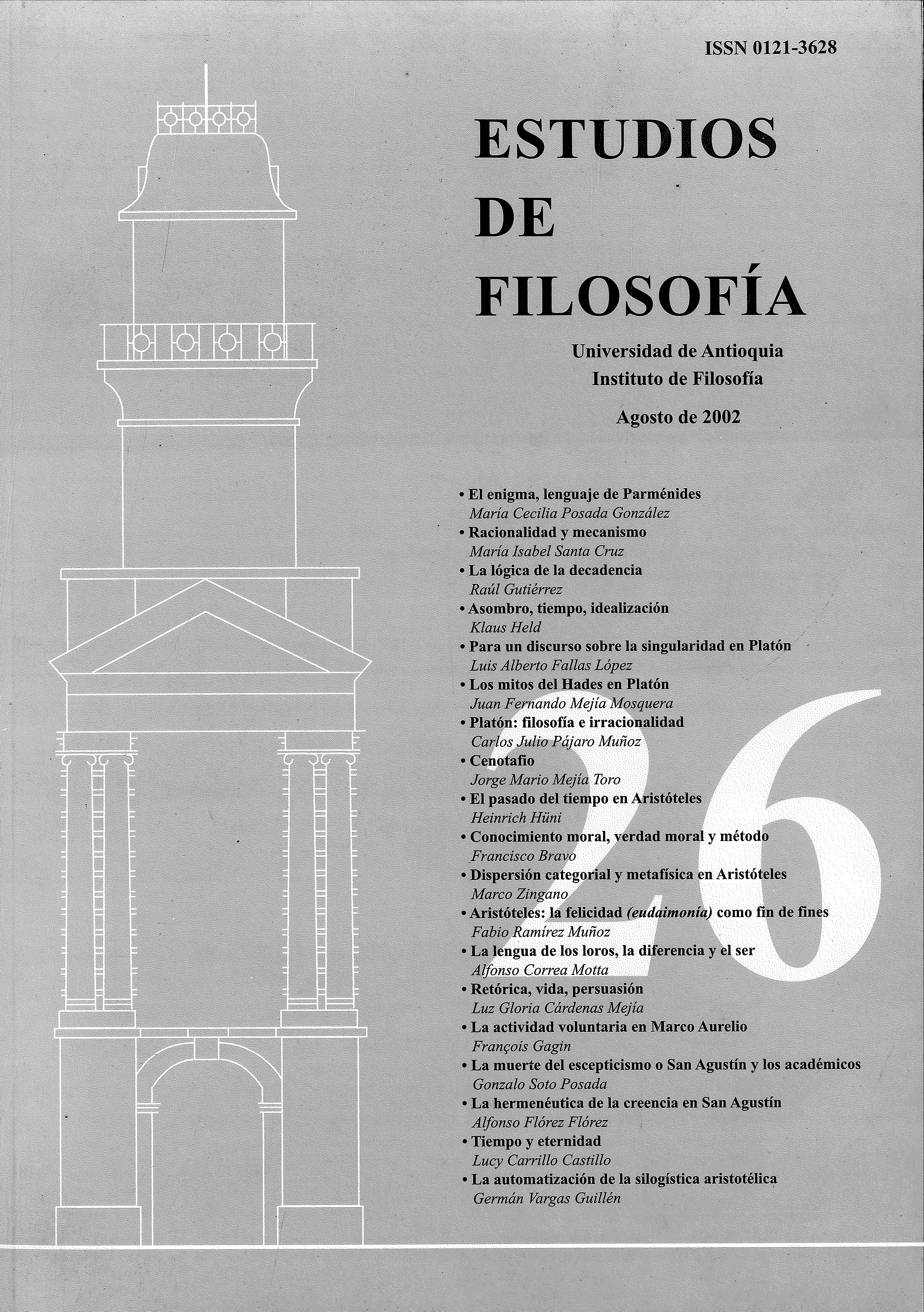Hermeneutics of belief in San Augustine
DOI:
https://doi.org/10.17533/udea.ef.14981Keywords:
Augustine, hermeneutics, belief, knowledge, understandingAbstract
The complex relations that come about between believing and knowing and between knowing and believing, without it being possible to assign priority to any of such acts are considered here. This circle is fundamental for the constitution of human life, just as its enrooting shows it in language, a primordial gift, which makes the dynamics of a belief possible.
Downloads
References
FITZGERALD, A. D. Diccionario de San Agustín. San Agustín a través del tiempo. Burgos: Editorial Monte Carmelo, 2001. De aquí esp. los arts. Fe (E. TeSelle) y Voluntad (M. Djuth).
GADAMER, H-G. Verdad y método. Salamanca: Sígueme, 1977 (ver esp. III. 13.2: Lenguaje y verbo).
________________Diálogo con J. Grondin, en: Antología. Salamanca: Sígueme, 2001, esp. 371 ss.
GRONDIN, J. Introducción a la hermenéutica filosófica. Barcelona: Herder, 1999.
HORN, Ch. Augustinus, en: RELEER, M. Y GRAESER, A. (eds). Philosophen des Altertums. Von Hellenismus bis zur Spätantike. Darmstadt: Wissenschaftliche Buchgesellschaft, 2000.
MARKUS, R. A. Marius Victorinus and Augustine, en: ARMSTRONG, A. H. (ed). The Cambridge History of Later Greek and Early Medieval Philosophy. Cambridge: Cambridge University Press, 1967.
RIST, J. Augustine. Ancient thought baptized. Cambridge: Cambridge University Press, 1994. DOI: https://doi.org/10.1017/CBO9780511520228
_________ Faith and Reason, en: STUMP, E. y KRETZMANN, N. (eds). The Cambridge Companion to Augustine. Cambridge: Cambridge University Press, 2001.
Downloads
Published
How to Cite
Issue
Section
Categories
License
Copyright (c) 2002 Alfonso Flórez Flórez

This work is licensed under a Creative Commons Attribution-NonCommercial-ShareAlike 4.0 International License.
Authors who publish with this journal agree to the following terms:
1. The Author retains copyright in the Work, where the term "Work" shall include all digital objects that may result in subsequent electronic publication or distribution.
2. Upon acceptance of the Work, the author shall grant to the Publisher the right of first publication of the Work.
3. The Author shall grant to the Publisher a nonexclusive perpetual right and license to publish, archive, and make accessible the Work in whole or in part in all forms of media now or hereafter known under a Creative Commons Attribution-NoCommercia-ShareAlike (CC BY-NC-SA 4.0), or its equivalent, which, for the avoidance of doubt, allows others to copy, distribute, and transmit the Work under the following conditions: (a) Attribution: Other users must attribute the Work in the manner specified by the author as indicated on the journal Web site;(b) Noncommercial: Other users (including Publisher) may not use this Work for commercial purposes;
4. The Author is able to enter into separate, additional contractual arrangements for the nonexclusive distribution of the journal's published version of the Work (e.g., post it to an institutional repository or publish it in a book), as long as there is provided in the document an acknowledgement of its initial publication in this journal;
5. Authors are permitted, and Estudios de Filosofía promotes, to post online the preprint manuscript of the Work in institutional repositories or on their Websites prior to and during the submission process, as it can lead to productive exchanges, as well as earlier and greater citation of published work (see The Effect of Open Access). Any such posting made before acceptance and publication of the Work is expected be updated upon publication to include a reference to the Estudios de Filosofía's assigned URL to the Article and its final published version in Estudios de Filosofía.















